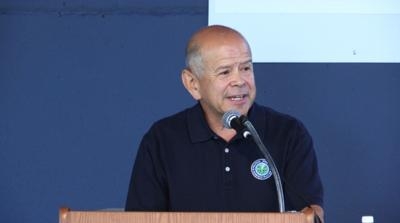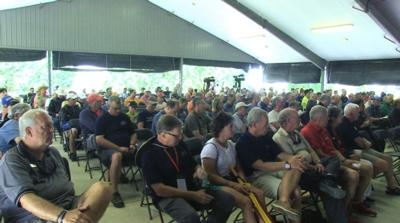Annual 'Meet The Administrator' Session Held Thursday AirVenture
FAA Administrator Michael Huerta held his annual "Meet the Administrator" session at AirVenture Thursday morning, but anyone who attended hoping to hear something new or substantial was probably pretty disappointed.

To be sure, there have been several significant developments in aviation rules and issues over the past 12 months, including the adoption of part 107 for Unmanned Aerial Vehicles, an NPRM for an update of Part 23 dealing with small aircraft certification, and a mandate from Congress for the agency to update its aero-medical rules to make it easier for pilots and potential pilots to be medically qualified. Much of that, Huerta said, has to do with the agency's shift to a risk-based approach to aviation safety.
Huerta said that the agency was moving forward with the 3rd class medical reform. "The legislation gives us 180 days to draft a rule that will generally allow a pilot to fly without a medical certificate if a number of conditions are met. I've assembled a dedicated team that is in charge of drafting the necessary text and moving it through our rulemaking process as quickly as we can, on the timeline that Congress has laid out," Huerta said.
Huerta also reiterated that the January 1 2020 deadline for ADS-B equipage will not be extended, and went over the criteria for the agency's rebate program.
The administrator said that the recent policy allowing the installation of non-certified instruments by Dynon and Garmin in certificated airplanes will lead to similar rulings. "This will improve safety, it will reduce cost, and will make it easier to install equipment like traffic advisory systems, or terrain awareness and warning systems, attitude indicators, fire extinguishers, and autopilots for stability augmentation."
Huerta also said that the agency is changing the way it certifies pilots.

"Last month, we started to roll out new airman certification standards which were developed as a collaborative effort spanning five years between the FAA and industry. By integrating knowledge and risk management with practical skills. These standards are designed to define what a pilot needs to know, to consider, and to do to fly safely in the complex airspace we have here in the united states."
Huerta expressed concern about the lack of a long-term funding measure for the FAA, and said that aviation is funded largely by airline ticket taxes that do not include extra fees charged by the airlines. Fuel tax revenue has also been stable or declining due to fuel savings from increased engine efficiency and performance-based navigation. "The conversation we need to be having is 'what does the agency need to do, how do we pay for it, and how do we give it stability'," Huerta said. "So we have to use this next year to focus on how we build a public understanding of what the agency wants to do, how to get there, and how do we pay for it."
Huerta said that he feels like the agency has been responsive to the GA community, and not simply reactive to mandates from Congress, as was suggested by ANN's Jim Campbell. He cited the non-certified equipment STCs and ADS-B rebates of examples of how the agency has worked with industry to affect change. But overall, the speech ... which was presented to about a half-full Pavilion 7 ... was a look back rather than a look ahead.
(Staff images)
 ANN's Daily Aero-Linx (04.16.24)
ANN's Daily Aero-Linx (04.16.24) Aero-News: Quote of the Day (04.16.24)
Aero-News: Quote of the Day (04.16.24) Airborne 04.10.24: SnF24!, A50 Heritage Reveal, HeliCycle!, Montaer MC-01
Airborne 04.10.24: SnF24!, A50 Heritage Reveal, HeliCycle!, Montaer MC-01 Airborne 04.12.24: SnF24!, G100UL Is Here, Holy Micro, Plane Tags
Airborne 04.12.24: SnF24!, G100UL Is Here, Holy Micro, Plane Tags Airborne-Flight Training 04.17.24: Feds Need Controllers, Spirit Delay, Redbird
Airborne-Flight Training 04.17.24: Feds Need Controllers, Spirit Delay, Redbird




